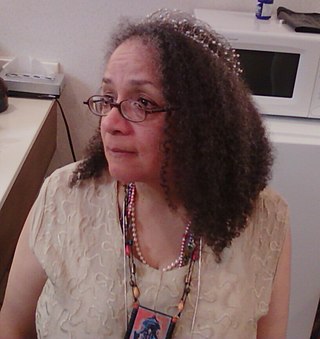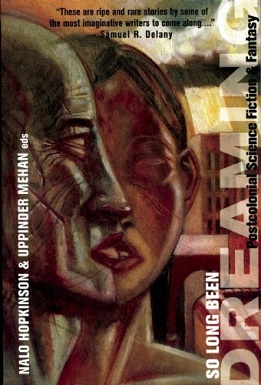Related Research Articles
Postcolonial literature is the literature by people from formerly colonized countries, originating from all continents except Antarctica. Postcolonial literature often addresses the problems and consequences of the decolonization of a country, especially questions relating to the political and cultural independence of formerly subjugated people, and themes such as racialism and colonialism. A range of literary theory has evolved around the subject. It addresses the role of literature in perpetuating and challenging what postcolonial critic Edward Said refers to as cultural imperialism.

Nalo Hopkinson is a Jamaican-born Canadian speculative fiction writer and editor. Her novels – Brown Girl in the Ring (1998), Midnight Robber (2000), The Salt Roads (2003), The New Moon's Arms (2007) – and short stories such as those in her collection Skin Folk (2001) often draw on Caribbean history and language, and its traditions of oral and written storytelling.

Afrofuturism is a cultural aesthetic, philosophy of science, and history that explores the intersection of the African diaspora culture with science and technology. It addresses themes and concerns of the African diaspora through technoculture and speculative fiction, encompassing a range of media and artists with a shared interest in envisioning black futures that stem from Afro-diasporic experiences. While Afrofuturism is most commonly associated with science fiction, it can also encompass other speculative genres such as fantasy, alternate history, and magic realism. The term was coined by Mark Dery, an American Cultural critic in 1993 and explored in the late 1990s through conversations led by Alondra Nelson.

Mami Wata is a water spirit venerated in West, Central, and Southern Africa and in the Afro-American diaspora. Mami Wata spirits are usually female but are sometimes male.

Grace Nono is a Filipino singer, known for her musical style based on traditional Filipino rhythms. She is also an ethnomusicologist, scholar of Philippine shamanism, and cultural worker.

There are many cultural aspects surrounding how societies view menstruation. Different cultures view menstruation in different ways. The basis of many conduct norms and communication about menstruation in western industrial societies is the belief that menstruation should remain hidden. By contrast, in some hunter-gatherer societies, menstrual observances are viewed in a positive light, without any connotation of uncleanness.
Karin Lowachee is a Canadian author of speculative fiction. She is best known for her Warchild series, including Warchild (2002), Burndive (2003), and Cagebird (2005).

Nisi Shawl is an African-American writer, editor, and journalist. They are best known as an author of science fiction and fantasy short stories who writes and teaches about how fantastic fiction might reflect real-world diversity of gender, sexual orientation, race, colonialism, physical ability, age, and other sociocultural factors.

Black science fiction or black speculative fiction is an umbrella term that covers a variety of activities within the science fiction, fantasy, and horror genres where people of the African diaspora take part or are depicted. Some of its defining characteristics include a critique of the social structures leading to black oppression paired with an investment in social change. Black science fiction is "fed by technology but not led by it." This means that black science fiction often explores with human engagement with technology instead of technology as an innate good.

So Long Been Dreaming: Postcolonial Science Fiction & Fantasy (2004) is an anthology of short stories by African, Asian, South Asian, and Indigenous authors, as well as North American and British writers of colour, edited by the writer Nalo Hopkinson and Uppinder Mehan. Hopkinson provides the introduction, although it is usually misattributed to Samuel R. Delany.
Speculative fiction is defined as science fiction, fantasy, and horror. Within those categories exists many other subcategories, for example cyberpunk, magical realism, and psychological horror.

Samuel R. "Chip" Delany is an American writer and literary critic. His work includes fiction, memoir, criticism, and essays on science fiction, literature, sexuality, and society. His fiction includes Babel-17, The Einstein Intersection ; Hogg, Nova, Dhalgren, the Return to Nevèrÿon series, and Through the Valley of the Nest of Spiders. His nonfiction includes Times Square Red, Times Square Blue, About Writing, and eight books of essays. He has won four Nebula awards and two Hugo Awards, and he was inducted into the Science Fiction and Fantasy Hall of Fame in 2002.
Andrea Hairston is an African-American science fiction and fantasy playwright and novelist. Her novel Redwood and Wildfire won the James Tiptree, Jr. Award for 2011. Mindscape, Hairston's first novel, won the Carl Brandon Parallax Award and was short-listed for the Philip K. Dick Award and the James Tiptree, Jr. Award. Hairston was one of the Guests of Honor at the science fiction convention Wiscon in May 2012.
Migration studies is the academic study of human migration. Migration studies is an interdisciplinary field which draws on anthropology, prehistory, history, economics, law, sociology and postcolonial studies.
Native American literature is literature, both oral and written, produced by Native Americans in what is now the United States, from pre-Columbian times through to today. Famous authors include N. Scott Momaday, Leslie Marmon Silko, Simon Ortiz, Louise Erdrich, Gerald Vizenor, Joy Harjo, Sherman Alexie, D'Arcy McNickle, James Welch, Charles Eastman, Mourning Dove, Zitkala-Sa, John Rollin Ridge, Lynn Riggs, Hanay Geiogamah, William Apess, Samson Occom, Gerald Vizenor, Stephen Graham Jones, et al. Importantly, it is not "a" literature, but a set of literatures, since every tribe has its own cultural traditions. Since the 1960s, it has also become a significant field of literary studies, with academic journals, departments, and conferences devoted to the subject.
Nuzo Onoh is a Nigerian-British writer. She grew up the third of eight children of the late Chief Mrs Caroline Onoh, a former headteacher. Her father was Chief Dr. C.C Onoh, the wealthy landowner, lawyer, politician, and former governor of Anambra State. She experienced the Biafran war with Nigeria (1967–70) as a child refugee within numerous Biafran villages and towns and at the age of 13, she was the victim of an attempted "exorcism" by a local pastor. Due to this experience, she advocates for greater awareness of ritual child abuse in African communities. On 17th June 2023, Nuzo Onoh became a recipient of the 2022 Bram Stoker Lifetime Achievement Award. The award is conferred on "an individual whose work has substantially influenced the horror genre", and "is an acknowledgment of superior achievement in an entire career." Nuzo is the first African and Black-British to win this award.
Indigenous Futurism is a movement consisting of art, literature, comics, games, and other forms of media which express Indigenous perspectives of the future, past, and present in the context of science fiction and related sub-genres. Such perspectives may reflect Indigenous ways of knowing, traditional stories, historical or contemporary politics, and cultural realities.
"Terminal Avenue" is a short story by Canadian author Eden Robinson. It was originally intended to be included in her 1995 short story collection Traplines but was omitted because, in Robinson's words, "back in the mid-90s, bondage porn didn't belong in a serious fiction collection." It was later included in So Long Been Dreaming, an anthology of postcolonial science fiction and fantasy edited by Nalo Hopkinson and Uppinder Mehan. It was also included in Walking the Clouds, an anthology of Indigenous science fiction edited by Gracle L. Dillon.
Grace L. Dillon is an American academic and author. She is a professor in the Indigenous Nations Studies Program, in the School of Gender, Race, and Nations, at Portland State University.

The term Chicanafuturism was originated by scholar Catherine S. Ramírez which she introduced in Aztlán: A Journal of Chicano Studies in 2004. The term is a portmanteau of 'chicana' and 'futurism', inspired by the developing movement of Afrofuturism. The word 'chicana' refers to a woman or girl of Mexican origin or descent. However, 'Chicana' itself serves as a chosen identity for many female Mexican Americans in the United States, to express self-determination and solidarity in a shared cultural, ethnic, and communal identity while openly rejecting assimilation. Ramírez created the concept of Chicanafuturism as a response to white androcentrism that she felt permeated science-fiction and American society. Chicanafuturism can be understood as part of a larger genre of Latino futurisms.
References
- 1 2 "On Writing, with Celu Amberstone" Open Book Ontario (May 8, 2012).
- ↑ Celu Amberston, Blessings of the Blood: A Book of Menstrual Lore and Rituals for Women (Beach Holme Publishing 1991). ISBN 9780888782991
- ↑ Celu Amberston, Deepening the Power: Community Ritual and Sacred Theatre (Beach Holme Publishing 1995). ISBN 9780888783578
- ↑ Celu Amberstone, The Dreamer's Legacy (Kegedonce Press 2012). ISBN 9780978499891
- ↑ N. A. Hayes, "Review of So Long Been Dreaming: Postcolonial Science Fiction and Fantasy by Nalo Hopkinson and Uppinder Mehan" Pop Matters June 21, 2004.
- ↑ Grace L. Dillon, Walking the Clouds: An Anthology of Indigenous Science Fiction (University of Arizona Press 2012). ISBN 9780816529827
- ↑ Joy Sanchez-Taylor, "Interplanetary Diaspora and Fourth World Representation in Celu Amberstone's 'Refugees'" Extrapolation 58(1)(2017): 77-94.
- ↑ Grace Dillon, "Miindiwag and Indigenous Diaspora: Eden Robinson's and Celu Amberstone's Forays into 'Postcolonial' Science Fiction and Fantasy" Extrapolation 48(2)(2007): 219-243.
- ↑ Agnieszka Podruczna, "The Diaspora in Space: The Question of Home, Ancestry and Heritage in Celu Amberstone's 'Refugees'" TransCanadiana 6(2013): 263-273.
- ↑ David T. Fortin, "Indigenous architectural futures: Potentials for post-apocalyptic spatial speculation" Beyond Architecture: New Intersections and Connections (2014): 475-483.
- ↑ Laura M. Stevens, "Early America through the Lens of Science Fiction" lecture, Obama Institute for Transnational American Studies, Johannes Gutenberg University Mainz, Germany: OK June 27, 2019.